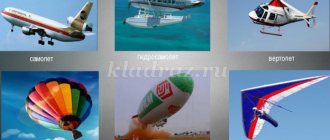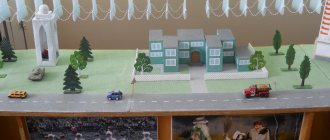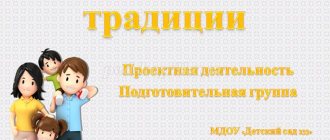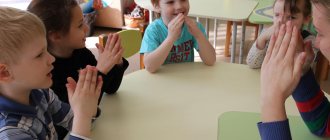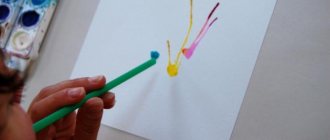Individual work in the preparatory group: a file cabinet with goals
Contents of the article:
When a child moves from the senior group to the preparatory group of kindergarten, this means that the next step on the path of his development will be entering school. It is during this period that children of 6 years old are no longer so interested in games. They begin to develop learning skills. At this stage, it is important to help the preschooler master skills that will help him more easily master new knowledge: concentrate on information, be disciplined and assiduous.
The child must acquire new knowledge and skills in order to quickly join the school community and adequately perceive the school curriculum. Individual work with children in the preparatory group also plays an important role in this.
When planning work with children, the teacher thinks through the interaction with a specific child. As a rule, such individual work of a teacher with a child in a preparatory group is one of the most effective.
At the time of the game or lesson, the teacher’s entire attention is given to one child, and he can notice difficulties in time, guide the student, suggest, and correct.
Card file of individual work in the preparatory group
To assess the effectiveness of a teacher’s work, it is necessary to develop a plan according to which classes, training and educational events will be conducted in a preschool institution. The developed card index of individual work in the preparatory group will provide indispensable assistance to educators as a guide.
It is the card index of the teacher’s individual work with students that contains the necessary data on the sequence of classes, excursions and other workloads that need to be organized for preschoolers in the preparatory group.
Download a card file with goals for individual work in the preparatory group Download in .pdf
Forms of individual work with children in the preparatory group
There is a wide variety of forms of work with preschoolers in the preparatory group. These are games, excursions, conversations, experiments, targeted walks, special activities, reading books, looking at illustrations, etc.
New career opportunities
Try it for free! Curriculum “Teacher Competencies”. For passing - a diploma of professional retraining. Training materials are presented in the format of visual notes with video lectures by experts, accompanied by the necessary templates and examples.
For individual work in the preparatory group on the formation of elementary mathematical concepts, didactic games are used:
- Games with numbers and numbers. To secure the account in forward and reverse order. Pupils, playing didactic games “Which number is missing?”, “Confusion”, “Correct the mistake”, learn to easily operate with numbers and verbally accompany their actions. Games like these help children who are behind in the curriculum learn the material.
- Games - time travel. Help preschoolers consolidate their knowledge of time, days of the week, and the names of all months of the year. These are games such as “Name it quickly!”, “Live Week”, “What time is it?”, “Twelve months”.
- Games for orientation in space. Their task: to teach or strengthen the ability of pupils to navigate in spatial situations, specially created, and to determine their location according to the conditions of the task. These are games - “Tell about your pattern”, “Find a similar one”, “Travelling around the room”, “Artist”, etc. Children through these games learn to find words to indicate the position of objects.
- Games with geometric shapes. Pupils are given the task of recognizing the shape of a triangle, circle, square, rectangle, oval in surrounding objects. Games such as “Make a square”, “Tangram”, “What do they look like”, etc.
- Logical thinking games. Examples: “Mill”, “What is the difference”. They are aimed at training children's thinking when performing actions.
For individual work in a preparatory group
for speech development are used:
- Word games. They develop children's intelligence, attention, coherent speech, and speed of reaction. In such games, students themselves must find signs of similarities and differences between objects, group them by properties, describe them, guess objects from the description, and highlight their inherent characteristics. These are folk games like “Black and White”, “Colors”, etc.
- Board-printed games. Contribute to the systematization of children's knowledge about the world around them, the development of thought processes and operations. Examples of such games: “Paired pictures”, “Loto”, “Dominoes”, folding cubes and cut pictures, “Maze”.
- Games with objects. You can use not only toys, but also real objects. With the help of such games, students learn the signs and properties of objects and learn to classify them. These are games with folk educational toys (matryoshka dolls, barrels, mushrooms, balls), spillikins, mosaics, and natural materials.
- Mnemonic tables, diagrams. This is a system of various techniques that facilitate the process of memorization in children and increase the volume of their memory through the formation of additional associations.
For individual work in the preparatory group on artistic and aesthetic development, the following are used:
- Games with objects. Preschoolers become familiar with the properties of various objects and their characteristics: color, size, shape, quality. Examples of such games: “Create a portrait”, “Forest clearing”, “Entertaining palette”, “Make a bouquet”.
- Printed board games: paired pictures, lotto, dominoes. Solve various development problems. Children love such games; for them it is an exciting activity.
- Verbal didactic games. They teach students to generalize phenomena, classify and assign objects to one category or another.
For individual work in the preparatory group on the development of fine motor skills of children’s hands, teachers use finger games, modeling, paper construction, simple construction, mosaics, and puzzles.
For individual work in the preparatory group in the field of developing logical thinking, stimulating mental processes in children, and developing knowledge about the world around them, printed board games are used. Examples of such games: “Connoisseurs of fairy tales”, “Tale by tale” (associations), “Who lives in the house?”, “Part and whole”, “Name in one word”, lotto “Wild and domestic animals”, “Professions”, “Choose by color and shape.”
Individual work of narrow specialists in preparatory groups
The staff of almost every preschool institution includes a music director, a speech therapist (defectologist), an educational psychologist, and a specialist in physical education and arts activities. Their plans also include individual work with children in the preparatory group
A speech therapist teacher deals with the development of speech in preschool children and, if necessary, creates individual sounds. The physical education teacher evaluates the motor development of children and corrects them in case of lag. The music director forms the general musicality of the students (sensory abilities, sense of rhythm, pitch hearing), develops expressiveness of movements, singing voice.
The systematic work of all specialists together acts as a guarantor of the comprehensive development of a preschooler. And if the child develops, then preparation for school is happening in the best possible way. Another indisputable advantage of individual work in a preparatory group is personal contact between the teacher and the child, during which, in addition to educational ones, educational tasks are also solved.
Plan of individual work with children in the preparatory group for the year
A plan for individual work in a preparatory group with children for a year is a program developed in detail by the teacher for each area of development of a preschooler. If we consider, for example, physical education, the plan will schedule the days and hours of training sessions, jogging, and gymnastic exercises. The necessary standards will be recorded.
Individual work is also carried out during walks in the preparatory group. Outdoor art classes are great when children draw what they see while walking.
www.resobr.ru
Educational and methodological material (senior group) on the topic: Individual educational route
Educational and methodological material (senior group) on the topic: Individual educational route
Teacher of the preschool group of the municipal educational institution "Raikonkosskaya secondary school" Smirnova Margarita Sergeevna.
“Designing an individual educational route for preschoolers in the context of the Federal State Educational Standard for Education” (72 hours)
Mini-project on the topic: “Individual educational route for a preschooler”
The preschool group of the municipal educational institution "Raikonkosskaya secondary school" carries out its work according to the educational program of preschool education "From birth to school" ed. NOT. Veraksy, T.S. Komarova, M.A. Vasilyeva. An individual educational route has been prepared for a boy in the senior preschool group, Arseny Sh., 5.5 years old. Arseny is being brought up in a complete family, the second child. There are also older and younger sisters. Spends most of his time with his grandparents.
For pedagogical diagnostics, the following methods were used: • observation of the child’s behavior in various types of activities (communication with adults and peers, play, child labor and self-service, visual and constructive activities) • study of the products of children’s activities • free conversations with children • assessment of aggressiveness child (Baker, M. Alvord) • “Cactus” technique (M.A. Panfilova) • parent survey
Observation was carried out on a daily basis, in all educational situations, in naturally occurring educational situations: in a group, on a walk, during arrival and departure from kindergarten, and communication between the child and his parents.
Pedagogical diagnostics showed that Arseny has minor problems in speech, artistic, aesthetic and physical development. The child has the most significant problems in social and communicative development; most criteria have a low level of pedagogical influence. Six criteria for assessing the identification of aggressiveness (P. Baker, M. Alvord) have been present in Arseny for 6 months, which indicates the presence of aggressiveness. The graphic method “Cactus” was also carried out, the purpose of which was to identify the state of the child’s emotional sphere, identify the presence of aggression, its direction and intensity. This technique showed the presence of aggression, as well as such traits as impulsiveness, uncertainty, and the child’s desire for loneliness.
A survey of parents to identify the characteristics of the child’s behavior at home and relationships with loved ones also showed that the child has difficulties communicating with his father and often conflicts with his sisters. Feels more comfortable outside the home.
IOM will be carried out for two months (March, April) in the form of group forms and individual lessons. Individual classes on speech development and physical development will be held daily during routine moments and specially organized activities.
Integration with other specialists
There is no music director, physical education instructor, psychologist, or speech therapist in the preschool groups of the Raikonkosskaya Secondary School. Children with a low level of effectiveness of pedagogical influences are sent to PMPK in Petrozavodsk.
Methods for assessing knowledge
Repeated diagnostics (Afonkina, Yu. A. Pedagogical monitoring in a new context of educational activities. Study of individual development of children. Senior group), observation.
The benefits of individual work with children
As a rule, when planning, the teacher prescribes what kind of work will be carried out with a particular child. It depends on the needs of each baby.
This form of work between a teacher and a student is one of the most effective. Indeed, during the period while the lesson or game is being conducted, the specialist’s attention is completely devoted to this child, which means that the teacher can notice any difficulties in time, guide the child, suggest and correct.
Individual work with children in the preparatory group, as already mentioned, must be planned. Often, an educational psychologist can give recommendations on its organization (based on diagnostic results). And, of course, such work will be many times more effective if parents are involved in it. Work with children in preschool educational institutions is carried out in each section of the program and in different forms. Such planning allows you to cover all areas of the child’s development and avoid gaps, which will subsequently make it easier for him to adapt to school and ensure effective learning of the material.
Forms of individual work with children
What forms of work with preschoolers of the preparatory group are distinguished? There are a great many of them, here are at least some of them: specially organized daily activities, games, excursions, targeted walks, conversations, reading fiction, looking at illustrations, experimenting. Depending on what needs to be reinforced, the teacher plans individual work with children in the preparatory group. You can organize it on a daily basis. For example, during the reception of children, when not everyone has arrived yet, after a quiet hour or in the evening, after dinner. The time is also suitable when children are engaged in free activities, that is, playing in a group. During this period, the teacher invites the child to play with him, draw, read or watch a book. In the process of this activity, the assigned tasks are solved.
That is, the child enjoys the process, while simultaneously reinforcing and assimilating the material in a game or other type of activity offered to him.

